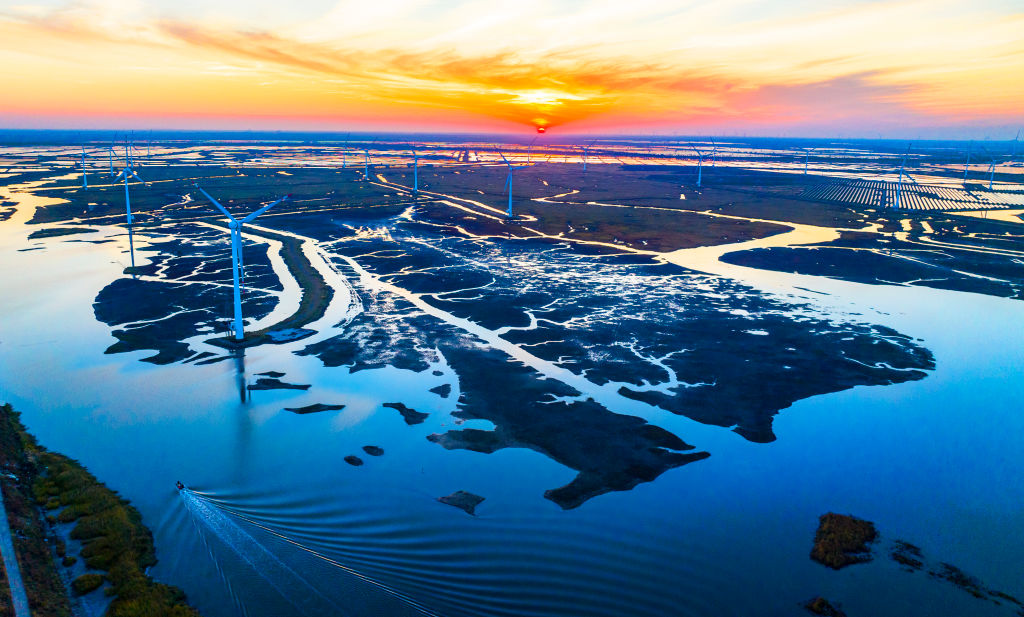Over the last two years, a positive wave of ocean action has been sweeping the planet. Its momentum offers the most powerful opportunity in recent memory to improve humanity’s relationship with the ocean.
The ocean hosts 95% of the planet’s life; it also absorbs 93% of its excess heat and about 30% of human-generated carbon dioxide. The ocean produces more than half of the oxygen on the planet. In fact, just one little photosynthetic creature in the ocean, the Prochlorococcus, provides 20% of the oxygen in Earth’s biosphere.
[time-brightcove not-tgx=”true”]
The development of a sustainable ocean economy includes a myriad of climate adaptation and mitigation opportunities. For example, by protecting and restoring blue carbon ecosystems like mangrove forests, seagrasses, and coral reefs, we can safeguard our coasts and the livelihoods of millions of people who live there; by supporting sustainable seafood, we can improve food security while keeping the carbon footprint of global protein production low. Meanwhile, by developing offshore wind alongside marine carbon dioxide removal projects, we could get back on track to meet the Paris Climate Agreement goal of keeping global temperature rise to 1.5°C above pre-industrial levels. And green shipping could help maintain the growth global trade in a carbon neutral manner.
Basically, the ocean and climate change are inextricably entwined. The good news is that recently there’s been a surge of engagement in ocean conservation and the development of a truly sustainable ocean economy that recognizes this reality. Corporations and banks now see the wisdom of being in on the action. Ocean-related start-ups and innovation are flourishing. The ongoing work of philanthropies, NGOs, and civil society is compounding. Ocean science is receiving more attention than ever before in human history, and despite current geopolitical tensions, there has been remarkable momentum on the ocean front in international arenas.
For example, in 2017, the United Nations General Assembly decision to declare 2021-2030 the “Decade of Ocean Science for Sustainable Development” is proof of the global commitment and momentum. And at the U.N. Ocean Conference in Lisbon in June 2022, participants from across governments, industry, and civil society presented a profusion of workable, science-based solutions for the ocean’s problems, committing at least $1 billion dollars towards the creation, expansion, and management of marine protected areas to restore ocean health. Kenya and Portugal, the co-hosts of the meeting, led the U.N. to commit to investing the needed resources and creating the policies necessary to protect and restore the ocean, while developing a sustainable ocean economy. Their progress and accountability will be closely examined at the next U.N. Ocean Conference in Nice in June 2025.
In Montreal last December, 196 countries agreed to the Global Biodiversity Framework, which will undertake to fully protect 30% of the planet —including ocean and coasts—from most human activities by 2030. And in June 2023, the Marine Biodiversity Beyond National Jurisdiction High Seas Treaty was adopted in New York. It’s a ground-breaking legal instrument that commits nations across the world to sharing responsibility for managing and protecting international waters. Meanwhile, at the World Trade Organization in Geneva, ongoing work to rid the world of harmful fisheries subsidies, or those that foster overfishing and illegal activities, is making steady progress, as are the efforts out of Nairobi to negotiate a treaty to control the rampant plastic pollution of our planet.
These are monumental steps in our struggle to meet the triple planetary crises of our times—human-induced climate change, biodiversity loss, and rampant pollution—but none will have any effect until they enter into force. Further, if we do not stop burning fossil fuels, we will continue to threaten biodiversity on our planet—and ultimately, therefore, the very survival of humankind. That’s why the phrase I always use when asked what matters most is “ratify and implement.”
If any of this sounds like hyperbole, these are not ordinary times. Based on the findings of Earth scientists and meteorologists, U.N. Secretary-General António Guterres declared a red alert for humanity back in 2021, and things have only worsened since then. The most recent forecasts show we are on track for about 3°C global warming within the lives of our grandchildren. That is an unacceptable world of plague, fire, famine, and ferocious storms. Indeed, at the U.N. Ocean Conference in Lisbon, Guterres deeply apologized to the youth of the world for the dystopian future our generation has been preparing for them, and promised to spend his remaining years working in partnership with young people to work towards the 1.5°C warming goal. He has since conveyed throughout the U.N. system that henceforth youth and early career ocean professionals must not be at the periphery of our meetings, but rather at the meeting tables, helping to negotiate the future they will inherit.
The realities of our planetary responsibilities, and the absolute moral imperative of intergenerational justice, hopefully imbued with love, oblige us to start living in better balance with the world, to stop making war on nature, to make peace with it, and thereby to stop the decline in the ocean’s health.
There can be no fulfillment of the Paris Agreement without the ocean. To meet the 1.5°C goal, the world must make a massive pivot towards investment in ocean science, innovation, and the development of a truly sustainable and socially responsible ocean economy. We must make that pivot as if our grandchildren’s lives depend on it, because for many of them, that will be the case.
The “No Paris without the Ocean” session on the opening day of COP28, Nov. 30, 2023—co-hosted by TIME CO2 and the World Economic Forum Friends of Ocean Action—explored the centrality of the ocean to tackling the climate crisis. Watch the recording here.

